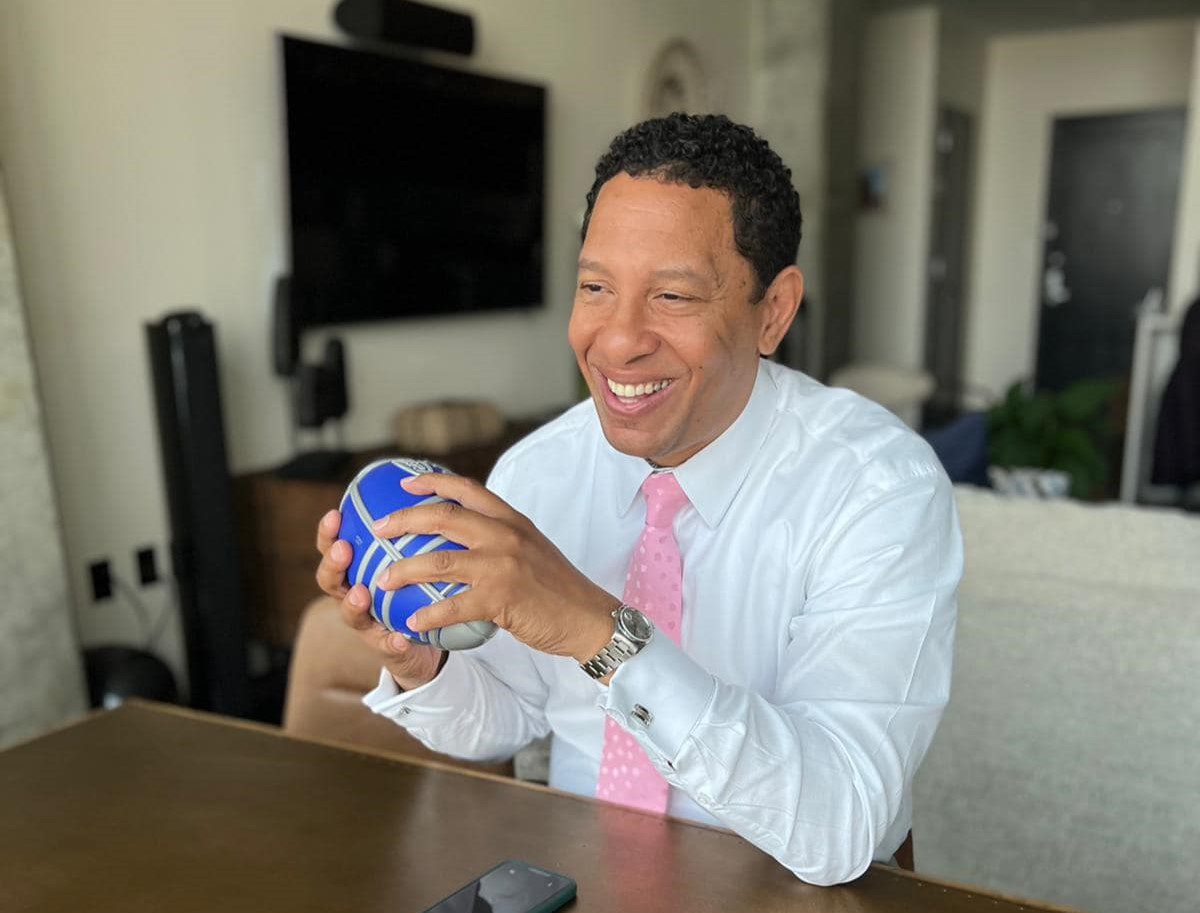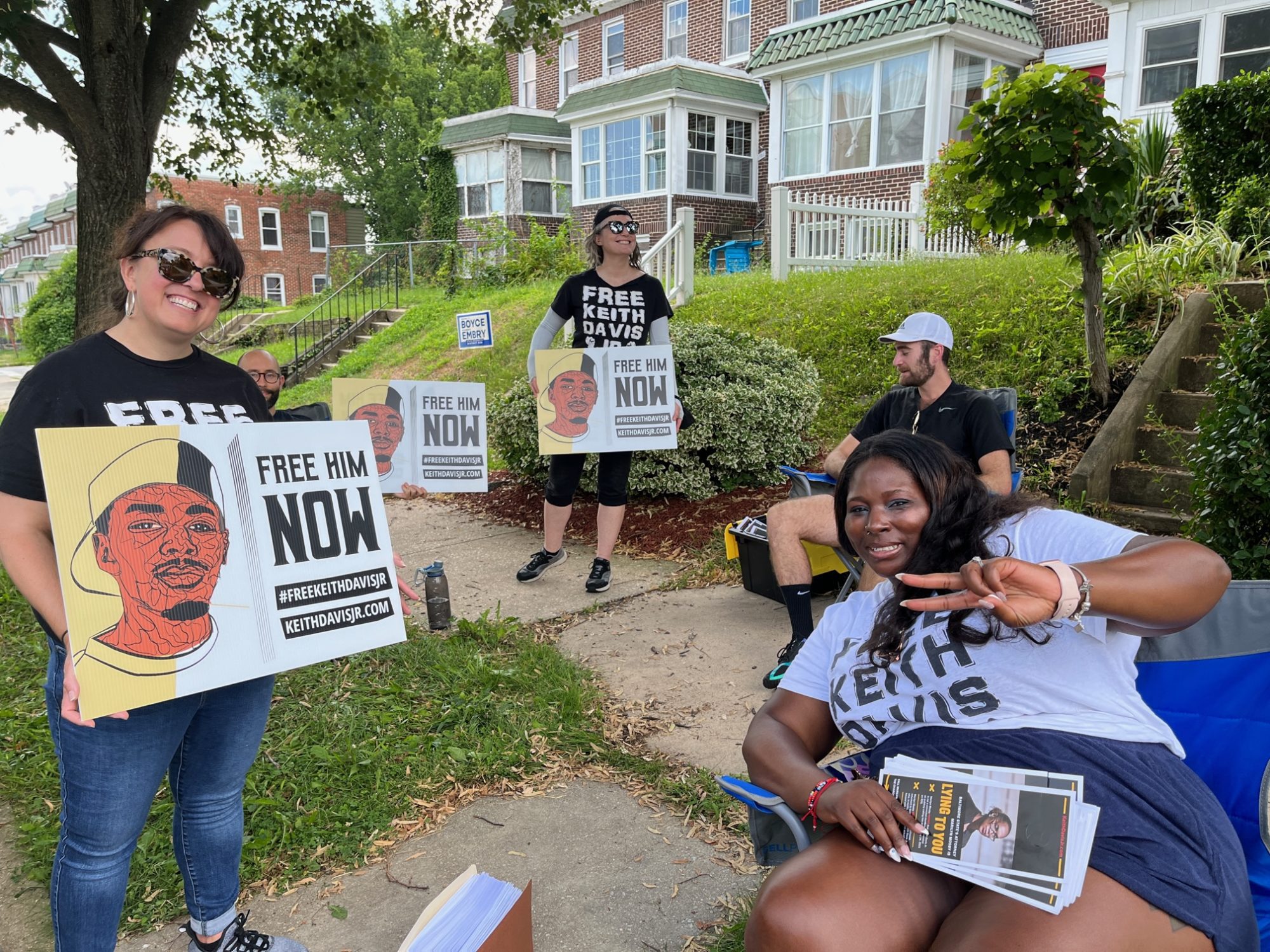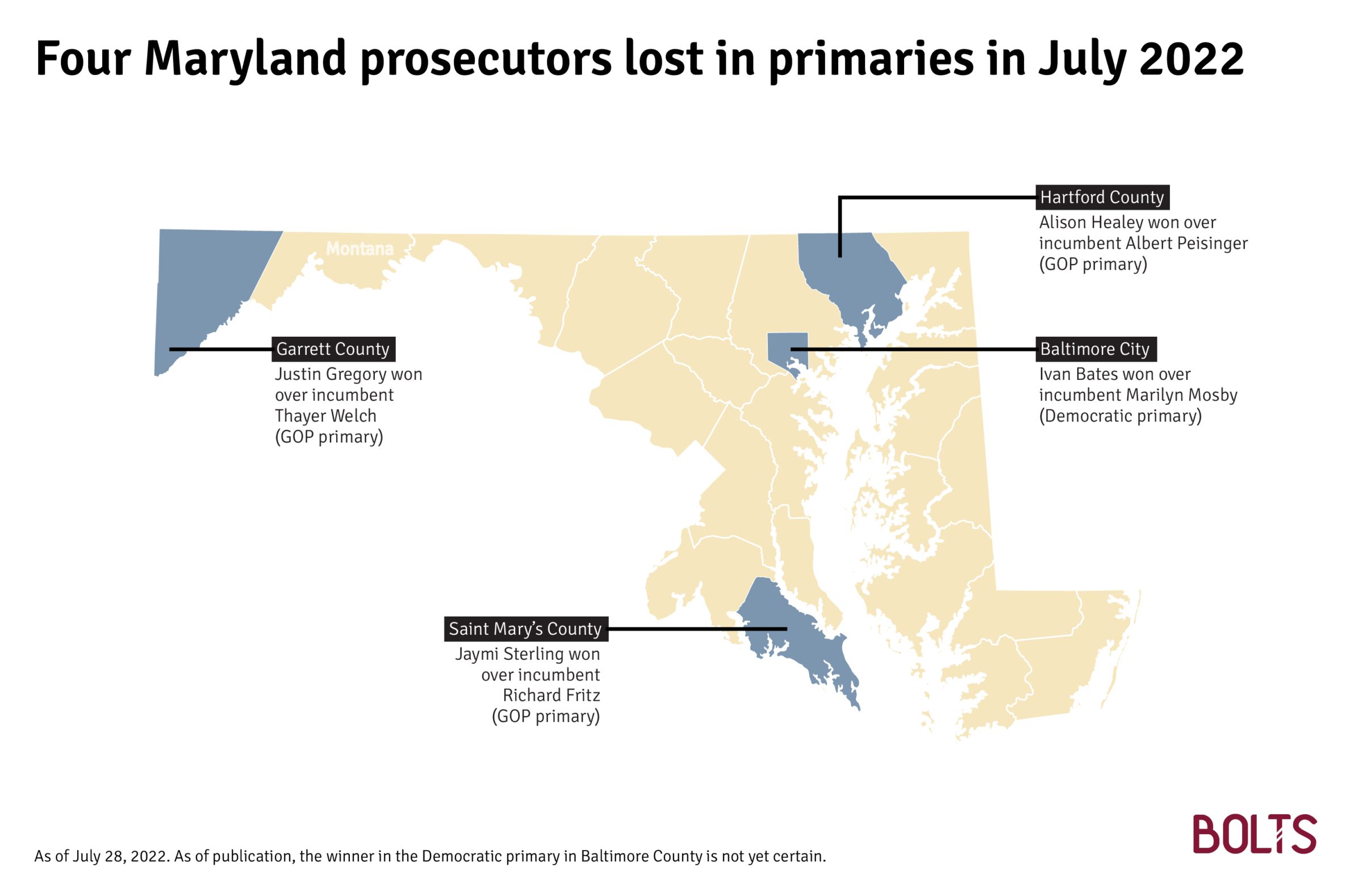Baltimore Ousts Its Embattled Prosecutor, Reshuffling Local Criminal Justice Policy
Ivan Bates defeated Marilyn Mosby after promising to drop charges against a man who has already faced four trials over the same allegations. He also ran on ramping up prosecutions and penalties in the city.
Jaisal Noor | July 28, 2022


Kelly Davis was cautiously optimistic as she greeted primary day voters trickling into an East Baltimore polling place under the blazing hot sun on the afternoon of July 19. She and a handful of others supporting her husband Keith had fanned out to polling places across the city, wearing shirts and holding signs emblazoned with the words “Free Keith Davis Jr,” which in recent years has become a rallying cry for local activists.
Baltimore police fired a hail of 44 bullets at Keith Davis in June 2015, striking him three times. Keith survived, but he has since been tried five times over the events of that day. After he was acquitted of robbery but found guilty of illegal gun possession in 2016, the local prosecutor’s office added murder charges and has relentlessly tried to convict him ever since. Two convictions were overturned due to allegations of prosecutorial misconduct; two other trials resulted in a hung jury. Still, prosecutors under Baltimore City State’s Attorney Marilyn Mosby indicated they were planning yet another trial—a fifth over the same allegations—which according to at least one legal observer would be nearly unprecedented.
Since her husband’s arrest in 2015, Kelly has been his most vocal and tireless advocate, pitting her against Mosby, who sought a third term in last week’s election.
“Keith is the most aggressively prosecuted man in American history,” she told Bolts. “We have a city full of murders and Keith faces a continuous cycle of malicious prosecution.” A judge ruled in June that Mosby’s continued prosecution of Keith Davis was driven by “personal animosity.”
Mosby’s campaign was plagued by other major legal woes, including a federal grand jury that indicted her earlier this year on multiple perjury charges over false statements she allegedly made related to her purchase of two vacation homes. Prosecutors have accused Mosby of lying to lenders to receive more favorable mortgage terms. Mosby said the charges were politically motivated and launched a re-election bid anyway.
In the run-up to the city’s July 19 elections, Kelly publicly backed Ivan Bates, the only candidate challenging Mosby in the Democratic primary who said he would drop the charges against Davis if elected. She even campaigned for Bates on Election Day alongside other members of “Team Keith,” a group of supporters who have waged an aggressive grassroots campaign to raise awareness of his case.
“Having so many people come to the polls that were familiar with Keith’s story … come out and say, ‘Hey, I voted for Bates,’ was a good feeling,” she told Bolts.
Bates defeated Mosby last week, grabbing the Democratic nomination by a comfortable margin of 41 to 29 percent over the incumbent. Another challenger, Thiru Vignarajah, received 30 percent. Bates will be unopposed in the general election, which makes him the city’s presumptive next prosecutor.
Since his win, Bates says he is now subject to a gag order, which Mosby has been accused of violating, that prevents him from making additional comments on what he’ll do with Keith Davis, but he told Bolts he stands by his previous statements.
“Ethically I can no longer talk about that because I’m no longer, quote unquote, a private citizen, but I can say, the way I felt then is still and will always be the way that I felt. I still feel that way,” he told Bolts. “My word is very important to me.”


Beyond his position on Davis’s case, Bates largely anchored his campaign on talk of ramping up prosecutions—criticizing Mosby for being too lenient on crime at a time of rising murders. Gun violence has increased around the nation but is especially high in Baltimore, and Bates has vowed to seek lengthy prison terms for illegal gun possession.
He has also said he would increase prosecution and penalties for the kind of lower-level cases that decreased significantly under Mosby, such as drug possession, prostitution and loitering.
Mosby took part in national networks of so-called progressive prosecutors, and she implemented a series of criminal justice reforms over her two terms. She engaged in reviews of old sentences, stopped prosecuting canabis possession, and during the pandemic she stopped charging low-level offenses like drug possession and prostitution.
Mosby rose to national prominence in 2015 for charging six Baltimore police officers over the death of 25 year old Freddie Gray in police custody but she was unable to secure a conviction in that case. Mosby’s opponents have blamed her for ongoing high murder and crime rates that have plagued the city—a critique she herself deployed against her opponent Gregg Bernstein in the 2014 election. Vignarajah accused her of turning Baltimore into a “crime scene” and campaigned more aggressively than Bates on rolling back her reforms; he was endorsed by Larry Hogan, the GOP governor who regularly clashed with Mosby. He finished narrowly ahead of Mosby but more than than 10 percentage points behind Bates.
Kelly Davis and some other local activists reject the notion that Mosby is progressive. Davis cites the ongoing prosecution of her husband, as well as reports that Black residents are still greatly overrepresented in cases that Mosby’s prosecutors bring to court. During the first six months of this year, city prosecutors requested that defendants be held without bail as they await trial, a process that often takes months, in over three out of every four cases observed by the group Baltimore Court Watch.
Data also indicates that arrests for some low level offenses such as drug possession, minor traffic violations and prostituion dropped significantly after Mosby stopped prosecuting those cases in March 2020. A 2021 Johns Hopkins study, commissioned by Mosby, found that police made 443 fewer arrests in the 14 subsequent months. While the report does not establish causality, it did find that the decrease in arrests did not pose threats to public safety, and the majority of the averted arrests were of African Americans.
Bates argues that Mosby’s policies of not prosecuting some offenses has fueled crime and caused confusion; during an interview, he mentioned a former client arrested with multiple pounds of cannabis telling him he thought that Mosby had legalized drug dealing.
Bates says he’ll resume prosecuting arrests for lower-level infractions such as drug possession. He said this not for the sake of punishing people. He argued that arrests give officials the opportunity to connect people with treatment and support, offering the example of police “engaging” a sex worker “to find out this person is being sex-trafficed and if they are, given the resources and the services that they need.”
Marguerite Lanaux, Baltimore’s top public defender, believes in alternative approaches that look to reduce the scope of the criminal legal system.
“Where you’re talking about treatment and treatment services, those things can occur without being justice-involved,” she told Bolts. She hopes that the city’s next prosecutor will reject the “immediate, feel good approach that more incarceration somehow leads to lower crime rates.”
Robbie Leonard, a defense attorney in neighboring Baltimore County, shares Lanaux’s analysis.
“There are other ways of providing services to people outside the court system,” he told Bolts. “And sometimes that’s hard for an attorney that’s only practiced criminal law to think outside courts, police, outside of arrests, and judges, but it can be done.”
Leonard also cautioned Bates against reflexively undoing policies that have proven effective, noting the mounting evidence that incarceration does not reduce recidivism or bolster public safety over the long term.
But Bates has said he’ll seek lengthy prison terms for gun possession. “If you’re a violent offender and you’re carrying an illegal handgun, we’ll be invoking the five-year minimum mandatory sentencing,” he told Bolts. There have long been heated debates in Maryland over whether to eliminate or strengthen mandatory minimum sentencing, which critics stress balloon prisons and pressure defendants into guilty pleas to avoid the harshest charges. Bates defends their deterrent effect. “I never enjoy sending people to jail,” he said. ”However I also can no longer stand by when we have so many funerals of young people in the city.”
Leonard, who is a former public defender, ran for prosecutor himself this summer in Baltimore County. (The county does not include the city of Baltimore.) He challenged State’s Attorney Scott Shellenberger, a fierce opponent of police and criminal justice reform. This was Shellenberger’s first primary challenge since he took office in 2006.
As of publication, some votes remain to be counted and the local press has yet to call the race, but Shellenberger leads 51 to 49 percent and appears to be the likely winner. Leonard told Bolts he is heartened by the results because it shows that there’s a path to victory for a reform candidate in the county, which has the reputation for being more conservative than the city.
Shellenberger is set to stand trial later this year over his office’s handling of sexual assualt cases, something Leonard says motivated him to run. The Daily Record reported on Thursday that Shellenberger told his staff he would take a leave of absence from his office, citing exhaustion. GOP nominee James Haynes awaits the Democratic nominee in November.
Three other prosecutors lost elsewhere in Maryland, all in Republican primaries. Saint Mary’s County’s Richard Fritz lost to Jaymi Sterling, a former employee of the office who is also the daughter of the current governor; Hartford County’s Albert Peisinger lost to Alison Healey, who benefited from heavy support from a local police union; and Lisa Thayer Welch ousted incumbent Justin Gregory in Garrett, a smaller county.


See: The full list of candidates running for prosecutor in Maryland.
None of these new GOP nominees will face an opponent in November; in total, all but three of Maryland’s 24 prosecutor races are now resolved.
Baltimore City was meant to have a contested general election as well but Roya Hanna, a defense attorney running as an independent who has also proposed rolling back some of Mosby’s reforms, announced on July 29 that he would drop out and endorse Bates, effectively sealing Bates’s victory.
Bates gained prominence for working as the defense attorney for Alicia White, one of six officers charged by Mosby over Gray’s death in police custody, and in 2018 for his role in exposing the Gun Trace Task Force, a group of corrupt Baltimore cops convicted of crimes ranging from robbery, extortion and overtime fraud.
For the city’s next state’s attorney, one of the first decisions will be how to handle the prosecution of Keith Davis. A court hearing scheduled for August will decide the date of the new trial sought by Mosby; if the trial goes forward, it would be his sixth.
Leonard praised Bates for his criticism of Mosby’s handling of the case. “Not prosecuting Davis is very important,” he said. He also hopes that Bates will not pursue a total break from some of the incumbent’s reforms. “He really needs to think about some of the policies Marilyn Mosby had that were successful, implement them, modify them—don’t eliminate them because they were implemented by someone he had to beat.”
Correction: An earlier version of this article misstated Jaymi Sterling’s relationship to Governor Hogan.
The article was updated on July 29 to reflect Roya Hanna’s decision to drop out from the general election.

